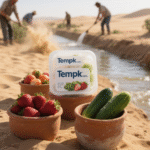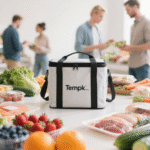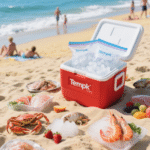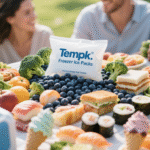Einführung
Transporting frozen food is crucial in the global supply chain, Da die Aufrechterhaltung niedriger Temperaturen während des Transits von entscheidender Bedeutung ist, um die Qualität und Sicherheit der Nahrung zu gewährleisten, direkte Auswirkungen auf die Gesundheit der Verbraucher. Jedoch, Traditionelle Methoden mit Trockeneis haben erhebliche Einschränkungen und Herausforderungen. Huizhou Industrial, leveraging its innovative cold chain packaging technology, Bietet eine Lösung, die den Bedarf an Trockeneis im gefrorenen Lebensmitteltransport beseitigt. Dieser Artikel untersucht die Herausforderungen des Transports gefrorener Lebensmittel, Die Grenzen der Verwendung von Trockeneis, und Huizhou Industrials modernste Lösungen.

Challenges in Transporting Frozen Food
Transporting frozen food presents numerous challenges, einschließlich Temperaturregelung, Transportkosten, Umweltauswirkungen, und Sicherheitsrisiken. Hier sind die wichtigsten Herausforderungen:
Temperaturregelung: Gefrorene Lebensmittel müssen bei extrem niedrigen Temperaturen transportiert werden, um Qualität und Sicherheit zu gewährleisten. Jede Temperaturschwankungen können zu Verderb oder Verlust der Wirksamkeit führen.
Transportkosten: Spezialisierte Verpackungsmaterialien und -ausrüstung, die für gefrorene Transportkosten erforderlich sind.
Umweltauswirkungen: Traditionelle Methoden, wie Trockeneis verwenden, can have a negative impact on the environment.
Safety Risks: The release of carbon dioxide from dry ice during transportation poses safety hazards.
Limitations of Using Dry Ice
Trockeneis (solid carbon dioxide) is commonly used in traditional frozen food transport, but it has several limitations:
Safety Hazards: Dry ice sublimates into large amounts of carbon dioxide, which can increase CO2 concentration in enclosed spaces, posing asphyxiation risks. Zusätzlich, its extremely low temperature can cause frostbite.
High Costs: The production and transport of dry ice are expensive, requiring specialized storage and handling equipment, which drives up costs.
Umweltauswirkungen: The production of dry ice releases significant amounts of CO2, contributing to environmental harm.
Limited Transport Time: As dry ice gradually sublimates during transport, its cooling effect diminishes over time, limiting transport duration.

Huizhou Industrial’s Innovations in Cold Chain Packaging
Drawing on extensive experience and innovative technology in cold chain packaging, Huizhou Industrial has developed a solution for transporting frozen food without the need for dry ice. Here’s an overview of their innovative approach and its advantages:
Traditional Dry Ice Transport Problems
Safety Hazards: As dry ice sublimates, it releases CO2, raising the risk of asphyxiation and frostbite.
High Costs: The production and transport of dry ice involve significant costs, requiring specialized equipment.
Umweltauswirkungen: The production of dry ice contributes to CO2 emissions, negatively impacting the environment.
Transport Time Limitation: The cooling effect of dry ice decreases over time due to sublimation, limiting the duration of effective cooling.
Huizhou Industrial’s Innovative Frozen Food Transport Solution
High-Performance Phase Change Materials (PCM)
PCM Working Principle: Phase change materials (PCM) absorb or release large amounts of heat at specific temperatures. As they absorb heat, PCMs undergo a phase change (Z.B., from solid to liquid), stabilizing the ambient temperature. Huizhou Industrial’s proprietary PCM products are highly efficient in heat absorption and release, maintaining low temperatures over extended periods.
Huizhou Industrial’s PCM Product Range: Huizhou Industrial has developed a range of high-performance PCM products tailored for different types of frozen food transport. These products provide long-lasting, stable low-temperature environments.

Advantages of PCM in Frozen Food Transport
Long-Term Low-Temperature Maintenance: PCMs provide consistent low temperatures over extended periods, ensuring the quality and safety of frozen food during transit.
Safe and Environmentally Friendly: PCMs do not release harmful gases, have no negative environmental impact, and offer high safety.
Benutzerfreundlichkeit: PCMs are reusable, do not require special storage or handling equipment, and reduce transportation costs.
Advanced Insulated Box Design
Multi-Layer Insulation Structure: Huizhou Industrial’s insulated boxes feature multi-layer insulation to effectively block external heat and maintain a stable internal temperature. These materials offer superior insulation, ensuring low temperatures during transport.
Leak-Proof Sealing Technology: The advanced sealing technology in Huizhou’s insulated boxes prevents external temperature influences. The sealed design prevents cold air leakage, maintaining internal temperature stability.
Lightweight Design: The insulated boxes are designed to be lightweight, reducing transport weight and costs while maintaining high strength and durability for safe transportation.
Smart Temperature Control System
Real-Time Temperature Monitoring: Huizhou’s smart temperature control system monitors internal temperatures in real-time, ensuring frozen food remains at a stable temperature during transport. The system records temperature data, providing detailed insights into temperature changes.
Automatic Adjustment Feature: The smart system automatically adjusts cooling equipment based on internal temperature changes, preventing fluctuations and ensuring food quality and safety.
Data Recording and Analysis: Huizhou’s system records temperature data in real-time and provides detailed analysis, helping businesses optimize temperature control strategies, improve transport efficiency, and enhance product quality.
Advantages of Huizhou Industrial’s Solutions
Long-Term Stable Low Temperatures: Huizhou’s solutions maintain consistent low temperatures for extended periods, ensuring the quality and safety of frozen food during transport. High-performance PCM and advanced insulated box designs effectively block external heat, keeping the internal temperature stable.
Reduced Transportation Costs: The lightweight design and efficient insulation materials reduce transport weight and costs. The reusability of PCM and the automatic adjustment features of the smart system also contribute to cost savings.
Enhanced Food Safety: Huizhou’s solutions use high-performance PCM and advanced insulation designs to ensure temperature stability during transport. The smart system’s real-time monitoring and data recording help businesses detect and address temperature issues, enhancing food safety.
Eco-Friendly and Sustainable: Huizhou’s solutions use environmentally friendly materials and efficient insulation technologies, with no negative environmental impact. The reusability of PCM and the energy efficiency of the smart system support sustainable development.

Abschluss
The transportation of frozen food is crucial in modern supply chains. Traditional dry ice transport methods have significant limitations and challenges. Jedoch, Huizhou Industrial’s innovative cold chain packaging technology offers a dry ice-free solution for frozen food transport. By using high-performance phase change materials (PCM), advanced insulated box designs, and smart temperature control systems, Huizhou’s solutions provide long-term stable low temperatures, reduce transport costs, improve food safety, and achieve eco-friendly sustainability. Huizhou Industrial’s innovative approach offers new perspectives and directions for frozen food transport, helping businesses stand out in a competitive market.























